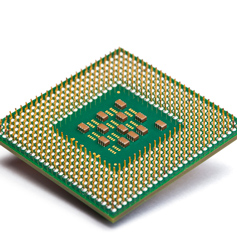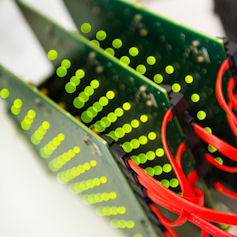
Advanced processor technologies
Our researchers
The APT group researches advanced and novel approaches to processing and computation, with an emphasis on identifying novel ways to exploit the formidable complexity of the multi-billion transistor microchips available today.
Our research into computer technology began more than 50 years ago with the construction of the world's first stored-program computer. Today the emphasis of the research is on identifying novel ways to exploit the formidable complexity of the billion transistor microchips that semiconductor technology will make commonplace over the next decade.
The APT group welcomes approaches from potential postgraduate students who are interested in studying for an MPhil or PhD with the group and we are keen to identify companies and other academic groups who are interested in collaborating with us in our research programmes.
Research focus
Our research is focused on the following specialist areas:
-
Many-core systems
We host world leading expertise in parallel and distributed computing workloads from compiler and software infrastructures to FPGA and runtime systems. We develop hardware and software tools that help engineers forge the path towards energy efficient computing.
Our collaboration with industry leaders, allows us to hit problems at the forefront of the discipline head-on, both in scale and complexity.
-
Neuromorphic computing
Our expertise ranges from the design of microchips through to large-scale systems such as the million-core SpiNNaker brain-modelling machine, and associated software from run-time systems through to a full software stack for neural systems engineering.
SpiNNaker is the world’s largest neuromorphic computing platform, and we support an open service under the auspices of the European Human Brain Project, with users from around the globe. We research the design and use of such systems to contribute to brain science and to improving the energy-efficiency of machine learning and AI applications.
We have extensive engagement in research aimed at developing the necessary processing technology for future exascale high-performance computing systems, and the use of advanced architectural techniques such as reconfigurable computing to enable computers to progress beyond the limits imposed by the impending end of Moore’s Law. We investigate ways to exploit the massive parallelism of future systems and the run-time systems and software required to support this.


